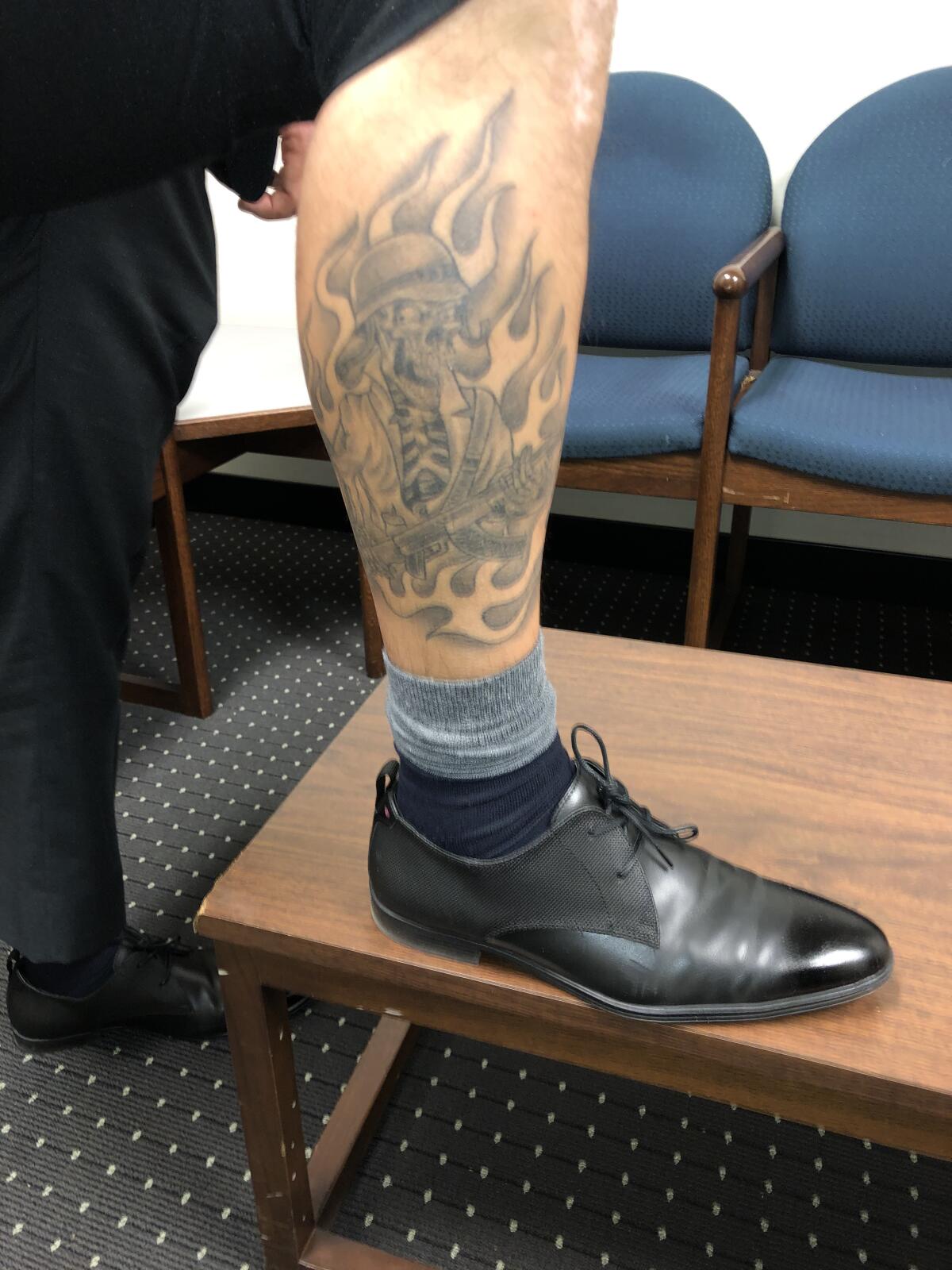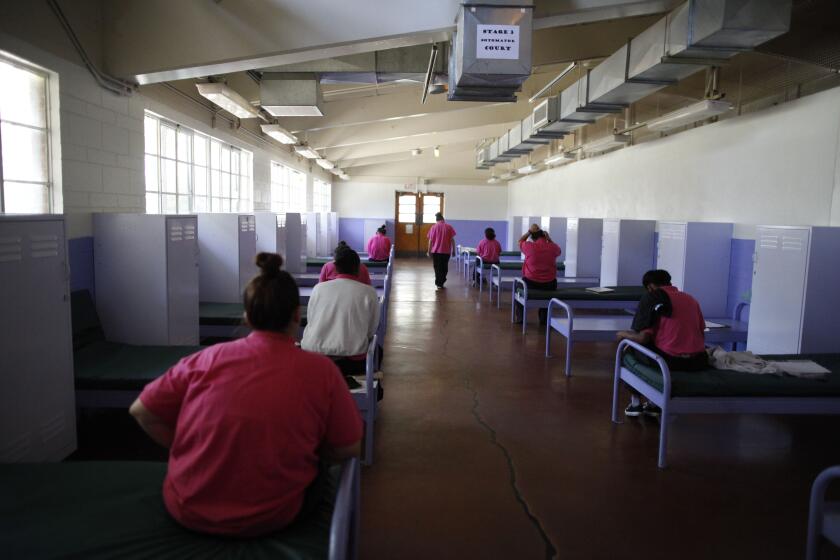Sheriff’s deputy testifies he attended seven ‘inking parties’ linked to Compton group

- Share via
A Los Angeles County sheriff’s deputy associated with the gang-like group of deputies with matching tattoos from Compton station testified that he has attended about seven so-called inking parties since he first saw the image on a shirt more than a decade ago.
During a deposition this month, Deputy Jaime Juarez was instructed by county lawyers not to answer questions about whether he has the Executioners’ tattoo, which depicts a skull with a rifle and a military-style helmet surrounded by flames, but he named a handful of deputies who do. Juarez admitted in the deposition that a truck displaying a flag with the image belonged to him.
Juarez said patrol deputies discuss who can get the tattoo, but he refused to call the process a “vote” or refer to those with matching tattoos as a “group,” according to the deposition.
For decades, the Los Angeles County Sheriff’s Department has struggled to combat secretive cliques of deputies who bonded over aggressive, often violent police work and branded themselves with matching tattoos.
He testified that he has participated in deciding who can get a tattoo — and a majority of deputies involved in the conversation have to agree. The last time he took part in one of those discussions, he said, five people were involved in the decision.
“The line deputies, the deputies that work patrol ... they decide if they feel a deputy who is a leader at the station, who conducts themselves in a professional manner, who served the public and the department with honor and respect, they conduct ethical police work, they’re a leader, they step up during critical incidents, they mentor younger deputies,” Juarez testified. “Those are the deputies they decide on.”
Juarez did not immediately respond Saturday to a request for comment. The Sheriff’s Department declined to comment Saturday about the deposition testimony. It also refused again to answer questions first posed by The Times last April related to its investigations into the Compton group.
‘Ghost guns,’ inking parties and a decades-long struggle to crack down on cliques within the Sheriff’s Department
The new testimony comes as part of a retaliation lawsuit filed by Lt. Larry Waldie, who alleges that he was targeted after he “openly opposed the domination of the station” by the Executioners — a group he says was led by Juarez — when he was acting captain of Compton station.
It offers an inside look into the inner workings of a secretive group that has garnered national attention. This month, a congressional subcommittee requested for a second time that the U.S. Department of Justice investigate allegations of systemic abuses by “criminal gangs” of L.A. County deputies that celebrate shootings and retaliate against whistleblowers.
The Sheriff’s Department has long faced allegations that gang-like groups of deputies operate in several stations, controlling commanders and glorifying aggressive policing tactics.
A congressional subcommittee requests again that the Justice Department investigate allegations of systemic abuses by L.A. County deputies.
Sheriff Alex Villanueva has downplayed the issue, saying problems associated with the groups are often the result of drunken deputies getting into fights and taking issue with those who refer to them as “deputy gangs.” On Wednesday, Villanueva sent a cease-and-desist letter to the Board of Supervisors, demanding members and others stop using the phrase.
But he has also taken credit for addressing the problem with a policy that prohibits deputies from joining groups that promote behavior that violates the rights of others.
A study commissioned by L.A. County and published last year found that 16% of the 1,608 deputies and supervisors who anonymously answered survey questions had been invited to join a group, with some invitations having come in the last five years. More than a third of respondents said the groups should be prohibited.
Los Angeles County has paid out roughly $55 million in settlements since 1990 in civil cases involving allegations that sheriff’s deputies belonged to a secret society, records show.
At their worst, the Rand Corp. report says, the groups encourage violence, undermine the chain of command and harm relationships with the communities the Sheriff’s Department serves.
In his deposition, Juarez said he first saw the skull image associated with the Executioners on a shirt during a benefit event in 2011. He named 11 deputies on whose bodies he had seen the tattoo. He said he was present when it was being drawn on six of them.
The tattoos were given by four or five different artists at different people’s homes, he said. The most recent inking event Juarez said he was present for was a year and a half or two years ago. Juarez said he’s heard the term “Executioners” in the news, but has never heard the term used at Compton station.
A new study finds that 16% of L.A. County Sheriff’s deputies and supervisors said in an anonymous survey they’ve been asked to join a secret clique.
Juarez said in his deposition that he was transferred out of Compton station along with a handful of other deputies about a year and a half ago. It’s unclear why they were transferred.
Two of those deputies, he said, were Miguel Vega and Chris Hernandez, who came under intense scrutiny in 2020 after they were involved in the controversial killing of Andres Guardado, 18, near an auto shop in Gardena.
They were relieved of duty several months later in connection with an earlier incident in which a skateboarder alleged the pair kidnapped him, threatened him, crashed their car and then lied to cover up their actions. The skateboarder agreed to settle his lawsuit against L.A. County for $450,000, his attorney said last year, though the agreement has not been finalized.
The Los Angeles County Sheriff’s deputies involved in a controversial shooting are under investigation for an encounter with a skateboarder, who accuses the deputies of lying to cover up misconduct.
A whistleblower deputy had testified in an unrelated excessive-force case that Vega and Hernandez were prospective members of the Executioners, which they both have denied. In his recent deposition, Juarez testified that Vega and Hernandez were never considered for getting the tattoo.
Juarez identified a second group of deputies at Compton station with another tattoo that is “like a gladiator or X-man.” He testified that he has seen about five people, including Waldie, with that tattoo and accused the lieutenant of showing favoritism toward them. Alan Romero, Waldie’s attorney, denied the favoritism claims, saying the lieutenant “went out of his way to treat everyone equally.”
More to Read
Sign up for Essential California
The most important California stories and recommendations in your inbox every morning.
You may occasionally receive promotional content from the Los Angeles Times.













